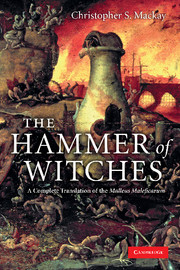Book contents
- Frontmatter
- Dedication
- Contents
- Map
- Introduction
- THE HAMMER OF WITCHES
- Structure of the text
- Author's Justification of the “Hammer for Sorceresses”
- Text of the Apostolic Bull
- Approbation and Signatures of the Doctors of the Illustrious University of Cologne
- PART I
- Question 1
- Question 2
- Question 3
- Question 4
- Question 5
- Question 6
- Question 7
- Question 8
- Question 9
- Question 10
- Question 11
- Question 12
- Question 13
- Question 14
- Question 15
- Question 16
- Question 17
- Question 18
- PART II
Question 5
from PART I
Published online by Cambridge University Press: 05 August 2015
- Frontmatter
- Dedication
- Contents
- Map
- Introduction
- THE HAMMER OF WITCHES
- Structure of the text
- Author's Justification of the “Hammer for Sorceresses”
- Text of the Apostolic Bull
- Approbation and Signatures of the Doctors of the Illustrious University of Cologne
- PART I
- Question 1
- Question 2
- Question 3
- Question 4
- Question 5
- Question 6
- Question 7
- Question 8
- Question 9
- Question 10
- Question 11
- Question 12
- Question 13
- Question 14
- Question 15
- Question 16
- Question 17
- Question 18
- PART II
Summary
For a fuller explanation of the foregoing, it is also necessary to counter certain objections that are raised. The question concerns five sorts of explanations for the works of sorcerers. There is a refutation of four of these explanations, on the basis of which they cannot have influence, and a conclusion about the fifth, the virtue of the intellect, on the basis of which they are able to have an influence (although good by nature, this virtue is evil by inclination). The four explanations are refuted as a rebuttal of those who deny the existence of both sorceresses and their works, and these explanations are the influences of the heavenly bodies, the movers of those bodies and orbs, the growing evil of humans, and the effectiveness of images, characters and words.
[TT] WHETHER a Catholic can in any way hold the view that the origin and increase in number of sorcerers' works derives from the influences of the heavenly bodies or from the superabundant evil of humans, and not from the filthy acts of incubus and succubus demons.
[AG 1] It seems that it derives from humans' own evil. For Augustine says in the Book of Eighty-Three Questions [4] that the cause of man's depravity goes back to his will, whether this will has been rendered depraved at someone's urging or at no one's. The sorcerer is rendered depraved by sin, and therefore the cause of it is not the Devil but human will. To the same effect, he says about free will that everyone is the cause of his own evil. This is proven by reason, too. A human's sin derives from free will, but the Devil cannot impel free will. For this would contradict freedom. Therefore, the Devil cannot be the cause of that or any other sin.
[AG 2] Also, in the book Ecclesiastical Dogmas [82] it says, “Not all our evil thoughts are set in motion by the Devil, but sometimes they arise from the impetus of our will.”
[AG 3]Next, it is proven as follows that they can come from the influences of the heavenly bodies and not from demons.
- Type
- Chapter
- Information
- The Hammer of WitchesA Complete Translation of the Malleus Maleficarum, pp. 139 - 159Publisher: Cambridge University PressPrint publication year: 2009



